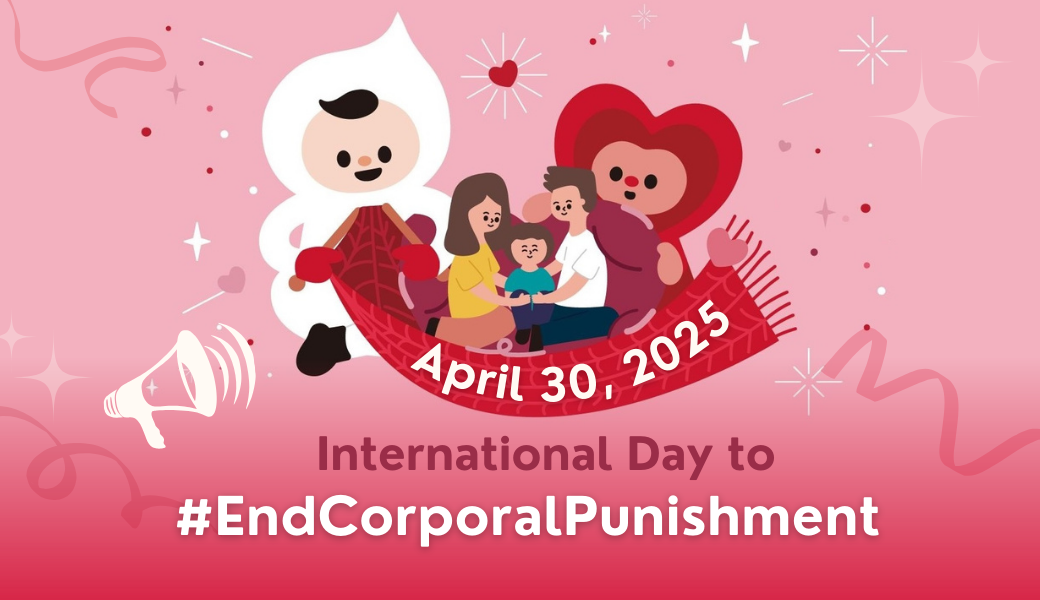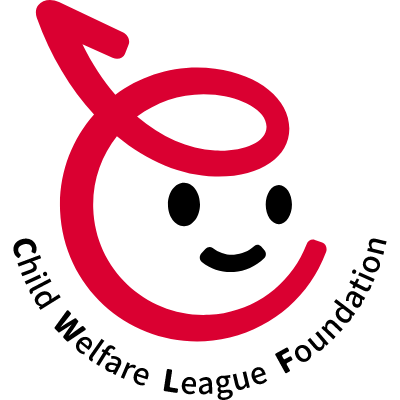
Join CWLF in Creating Non-Violent Childhoods on the International Day to #EndCorporalPunishment
The International Day to End Corporal Punishment on April 30 is an important moment to show global support for non-violent childhoods. To reach the Sustainable Development Goal Target 16.2 — ending all forms of violence and torture against children, it is crucial to reduce and eliminate corporal punishment, which is the most common and socially accepted form of violence against children [1].
For many years, Child Welfare League Foundation (CWLF) has been dedicated to child safety by launching the Orange Ribbon Campaign, the No Hit Zone Campaign, and other awareness-raising initiatives in Taiwan. This year, we invite you to join us in this meaningful movement to #EndCorporalPunishment!
Attitudes toward Corporal Punishment are Changing among People in Taiwan
CWLF conducted a survey on the experiences and attitudes of the Taiwanese public toward corporal punishment as a form of discipline [2]. According to the survey results, the proportion of Taiwanese people who agreed that "No matter the reason, hitting children should not be allowed" increased from 37% in 2014 to 54% in 2022. The percentage of those who agreed that "Regardless of the severity, corporal punishment is a form of violence" also rose from 47% in 2014 to 73% in 2022. Over the past decade, there has been a significant increase in awareness in Taiwan about protecting children and prohibiting corporal punishment.
Previous Milestones and Current Progress on the Legal Prohibition of Corporal Punishment in Taiwan
Law reform is one of the key steps to eliminate corporal punishment. Since 2006, corporal punishment has been prohibited in schools in Taiwan following the amendment to Article 8 of the Educational Fundamental Act [3]. In 2014, Taiwan incorporated the Convention on the Rights of the Child (CRC) into domestic law [4], showing its commitment to advancing child rights together with the international society. Although prohibited by law in school settings, corporal punishment remained implicitly permitted at home, and the Concluding Observations from Taiwan’s first CRC international review in 2017 called for improvement regarding these issues [5].
In November 2024, the Executive Yuan (Taiwan's highest administrative organ) approved a draft amendment to Article 1085 of the Civil Code to rescind the right of parents to use physical or psychological violence to punish their children [6]. The original Article stated that parents "may, within the limit of necessity, inflict punishment upon their children." The revised version of the article would instead state that parents should "give consideration to their children's age and level of development, respect their personalities, and not engage in mentally or physically violent behavior against them." [7]
This draft amendment was subsequently sent for review by the Legislative Yuan. Although many child rights organizations and the general public welcome the progress of this legal amendment, some parents still have concerns about it. They agree with the importance of preventing child abuse and violence but are struggling to use other parenting strategies as alternatives to corporal punishment. Therefore, more steps must be taken besides law reform to put prohibition into practice.
CWLF Calls for Strategies and Support to #EndCorporalPunishment
To achieve the goal of creating a violence-free environment for every child, CWLF calls for:
- Legal prohibition of corporal punishment in all settings: We urge the government to complete the review and implementation of the revised Article 1085 of the Civil Code. In addition, the concept of ending corporal punishment in the home and in all settings should also be explicitly incorporated into other child-related laws, such as the Protection of Children and Youths Welfare and Rights Act.
- Strategies and resources for positive parenting: In addition to asking parents not to inflict corporal punishment on their children, it is more important to acknowledge their concerns and struggles and provide effective alternatives for them. The government and civil society organizations can offer more supportive and educational services to strengthen family functioning and cultivate parenting skills. When equipped with knowledge and strategies of positive parenting, parents can better overcome the child-rearing challenges they face and enjoy healthy relationships with their children.
- More No Hit Zones: The global No Hit Zone (NHZ) movement aims to create a safe and caring environment for children, families, and staff in every location and facility. The four basic tenets are: no adult shall hit a child; no adult shall hit another adult; no child shall hit another child; and no child shall hit an adult. In 2022, leveraging extensive expertise in child and family services and child right advocacy, CWLF became the first certified NHZ advocate in East Asia, playing a leading role in the promotion of the NHZ movement as a resource center in Taiwan [8]. We urge more government agencies, NGOs, companies, schools, and families to join us in becoming a No Hit Zone.
CWLF’s Resources for Non-Violent Parenting
To support parents in their non-violent parenting journey, CWLF provides plenty of useful resources:
- Developmentally tailored tips for parents: These handouts are designed for parents with children in various age groups, including 0-1 year, 1-2 years, 2-3 years, 3-5 years, 5-10 years, and 10-18 years. With these resources, parents can learn to understand the motivations behind their children’s challenging behaviors and how to respond in a constructive way. These materials were translated from English into Traditional Chinese by CWLF with permission from the NHZ Committee.
- "Looking at Children's Hearts" semiannual magazine vol. 5: CWLF’s publication Looking at Children's Hearts vol. 5 focuses on positive parenting, guiding parents to better understand children’s developmental needs and practice non-violent discipline. It also emphasizes the importance of parents’ emotional self-care and how it contributes to healthy parent-child relationships.
- Online course on responsive parenting: Taking care of young children can be challenging, but responsive parenting can help. This free online course is designed for parents with children aged from 6 months to 4 years. Through video instruction and day-to-day practice, parents can learn to observe and respond to their children, be present with their children, and set reasonable boundaries, thus enhancing the quality of the parent-child relationship.
- Tips for positive parent-child communication: Good communication plays an important role in mutual understanding and conflict de-escalation. In this helpful article, parents can learn 6 tips for positive parent-child communication, such as how to give clear and encouraging instructions and how to actively listen to and respond to children.
On this important day, please join CWLF to #EndCorporalPunishment! Let’s create a safe and nurturing environment for every child to thrive.
[1] 40 countries make first-ever joint statement on corporal punishment to the Human Rights Council. https://endcorporalpunishment.org/first-hrc-joint-statement/
[2] CWLF’s 2022 survey on the experiences and attitudes of the Taiwanese public toward corporal punishment as a form of discipline. https://www.children.org.tw/english/news_detail/crprlpnshmntoagieVR
[3] Article 8 of Taiwan’s Educational Fundamental Act. https://law.moj.gov.tw/ENG/LawClass/LawSearchContent.aspx?pcode=H0020045&norge=8
[4] Taiwan’s Implementation Act of the Convention on the Rights of the Child. https://law.moj.gov.tw/ENG/LawClass/LawAll.aspx?pcode=D0050193
[5] Concluding Observations on the Initial Report of the ROC/Taiwan on the Implementation of the UN Convention on the Rights of the Child. https://crc.sfaa.gov.tw/Document/Detail?documentId=9711F049-5DEE-43BC-80FE-4F1ED2B30D6E
[6] Announcement by the Executive Yuan regarding the draft amendment to Article 1085 of the Civil Code. https://www.ey.gov.tw/Page/9277F759E41CCD91/306f42d1-05d7-4734-808a-7cfd2bddee3d
[7] Focus Taiwan (CNA English News): Executive Yuan proposes ban on corporal punishment by parents. https://focustaiwan.tw/society/202411280010
[8] CWLF kicked off the “No Hit Zone” Campaign in Taiwan. https://www.children.org.tw/english/news_detail/2023_Taiwan_No_Hit_Zone


